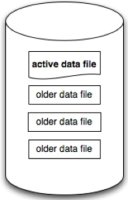Stuff The Internet Says On Scalability For January 14, 2011
 Friday, January 14, 2011 at 9:29AM
Friday, January 14, 2011 at 9:29AM 
Submitted for your reading pleasure...
- On the new year Twitter set a record with 6,939 Tweets Per Second (TPS). Cool video visualizing New Year's Eve Tweet data across the world.
- Marko Rodriguez in Memoirs of a Graph Addict: Despair to Redemption tells a stirring tale of how graph programming saved the world from certain destruction by realizing Aritstotle's dream of an eudaimonia-driven society. Could a relational database do that?
- The never never ending battle of good versus evil has nothing on programmers arguing about bracket policies or sync vs async programming models. In this node.js thread, I love async, but I can't code like this, the battle continues. In the end programmers desire async, but leave the bar with sync.
- Quotable Quotes
- @AmyDeLong: Walked into a starbucks and overheard 3 separate discussions all on scalability. #firstworldproblems #onlyinsf
- @chvest: You may not need "high" scalability, but you should still consider your growth rates and prepare.




















